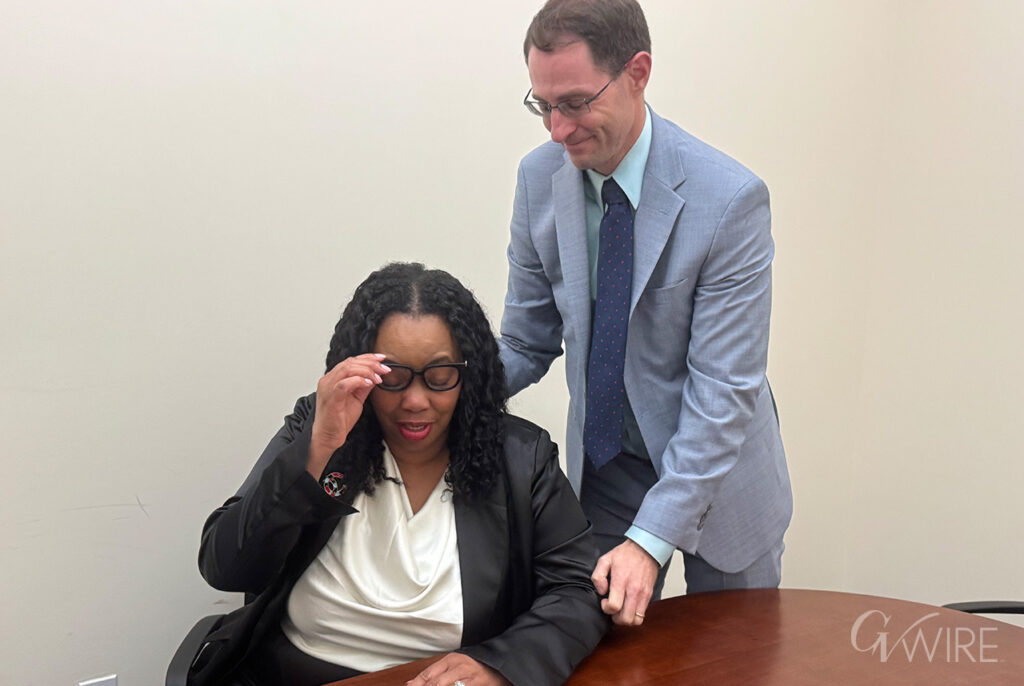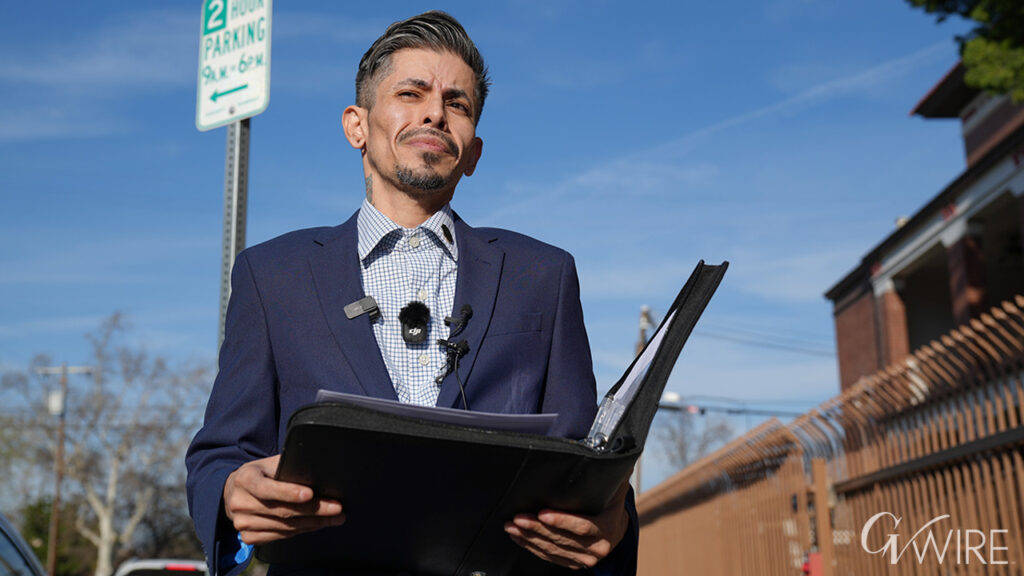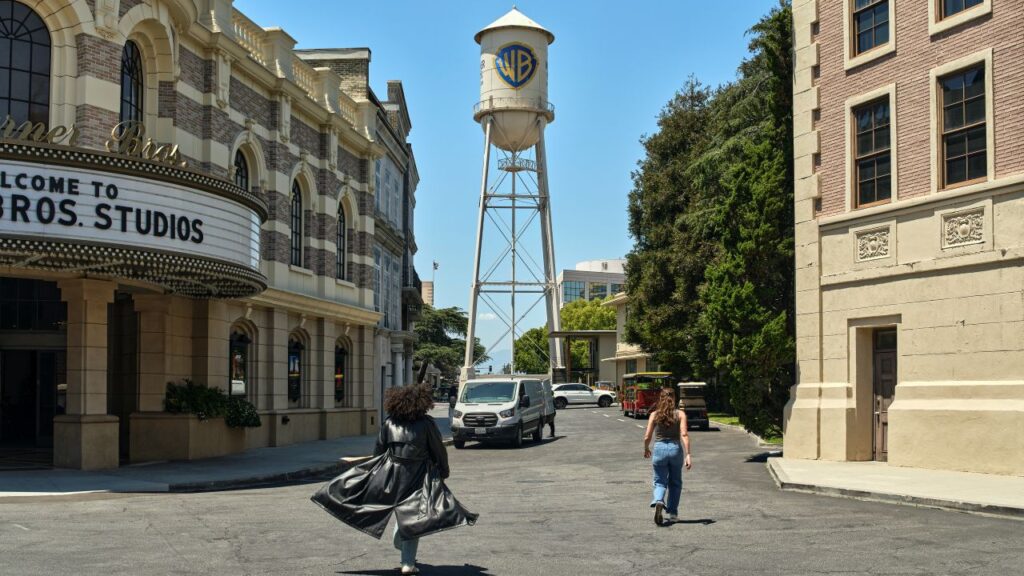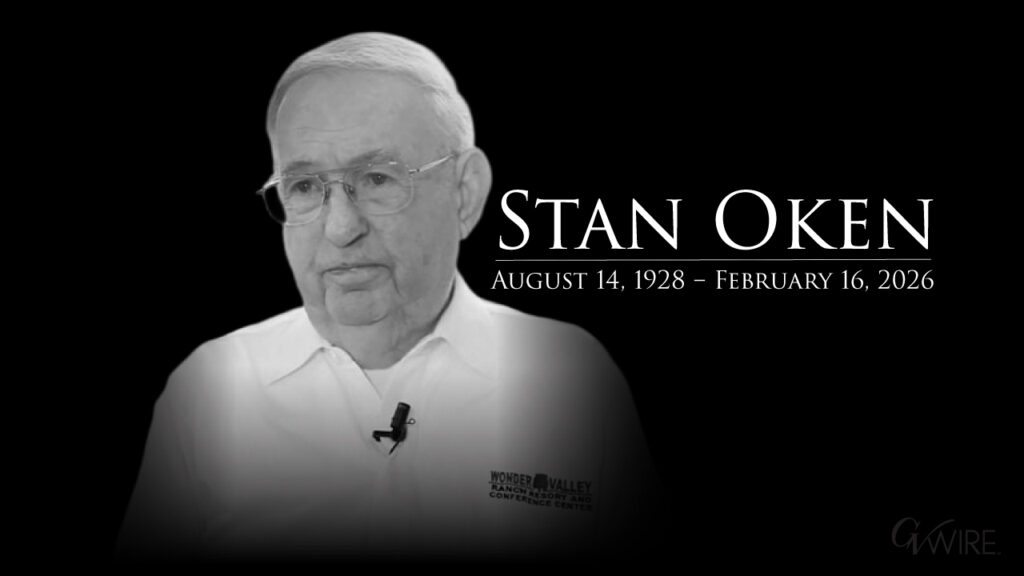Fresno politicians and business leaders called on Gov. Gavin Newsom to veto AB 98, which they say will hurt Fresno's economy and cost jobs. (GV Wire Composite/David Rodriguez)

- Local business leaders and politicians called on Newsom to veto AB 98, which would increase standards for warehouse development throughout California.
- Advocates of the bill say standards would protect the environment. Opponents say it puts additional burdens on industrial businesses already heavily regulated.
- When asked Tuesday by GV Wire about whether he would sign AB 98, Newsom said he was "not there yet."
Share
|
Getting your Trinity Audio player ready...
|
Fresno political and business leaders say a bill awaiting Gov. Gavin Newsom’s signature threatens future employment by imposing excessive building standards. They are calling on Newsom to veto the bill.
Originally an agricultural bill, Assemblymembers Juan Carrillo. D-Palmdale, and Eloise Reyes, D-Colton, repurposed Assembly Bill 98 to establish statewide standards on how warehouse buildings can be constructed.
Watch: Central Valley Leaders Ask Newsom to Veto Statewide Warehouse Bill
Advocates say the bill would create a new “21st century warehouse” adapted for California’s changing environment.
But opponents say the bill, changed only three days before the end of the legislative session, would jeopardize job growth and strip away local control.
“AB 98 represents a massive, unfunded mandate that would not only stifle local economies, but also seriously damage our local communities,” said Daniel Parra, Fowler mayor and president of the California League of Cities. “It’s a bill that was rushed through the legislature in the final week of the session with little regard for the impact it would have on cities.”
Related Story: Are You One of 22,000 Working in South Central Fresno? A Rezone Might Threaten ...
AB 98 Sets Statewide Standards for Logistics Businesses
AB 98 sets minimum standards for what future warehouse buildings in California would look like. The bill requires cities to outline facility designs such as loading docks, roofs, security gates, and parking lots to meet environmental standards based on the size of the building.
Requirements become more stringent for businesses located within 900 feet of a so-called “sensitive receptor” such as a school, community building, park, daycare, or home.
Companies building on property that formerly held a residence would have to replace each demolished unit with two affordable units. Any displaced tenants would receive 12 months’ rent from the developer.
Operators would also have to outline where their trucks would travel.
“This bill requires warehouse operators and developers to build a better product, operate responsibly, and be good neighbors to the communities they set up shop in,” Carrillo and Reyes wrote in their bill analysis. “AB 98 also requires local agencies to make responsible decisions that promote economic development while maintaining or improving the quality of life for their constituencies.”
Fresno City Councilmember Miguel Arias said AB 98 not only protects vulnerable communities but creates a level playing field. In affluent neighborhoods he said controversial projects can be denied for being within certain proximities to sensitive areas such as school. He said AB 98 gives low-income neighborhoods regulatory protection.
“Those that are promoting mega warehouses in our most polluted neighborhoods of color in the country reject them in their own luxury neighborhoods,” Arias told GV Wire.
Related Story: Council Rejects Luxury NW Fresno Apartment Project. What’s Next?
Newsom ‘Not There Yet’ On AB 98 Decision
Newsom on Tuesday told GV Wire’s David Taub he’s received nearly 700 pieces of correspondence on AB 98. He said it was interesting how scrutinized the bill has become.
“I’m not there yet, I don’t know, I haven’t had a chance to review it, but I’m deeply aware of people’s mixed emotions and feelings and assessments of that,” Newsom said.
Cost to Update City Plans Under AB 98 Could Be ‘Hundreds of Millions’: CA Senate
The Senate Appropriations Committee said the cost for the 483 cities and 58 counties to update their general plans and building codes was unknown but would be “major.”
They said it was “likely in the range of tens of millions to hundreds of millions of dollars in the aggregate.” Costs would also not be reimbursable by the state, according to analysis.
“AB 98 is an unfunded mandate requiring cities and counties to conduct multiple studies, diverting already scarce resources from vital services such as public safety, parks, and homeless initiatives,” said Fresno City Council President Annalisa Perea.
What’s more is the economic impact once those standards are set, said Will Oliver, president of the Fresno County Economic Development Corporation.
As of July 2024, 103,000 people in Fresno County work in either transportation, warehousing, or manufacturing sectors, Oliver said. Those industries create $4.4 billion in economic impact countywide.
“They not only support jobs within those walls and those facilities, but they create demand for ancillary services, for trade, for local supply chains,” Oliver said.
Related Story: Fresno State Weighs in on City’s Industrial Battle: Be Wary of ...
Industrial Land Some of the Most Regulated Statewide
Nick Audino, industrial broker and senior vice president with Newmark Pearson Commercial, said industrial buildings in California already go through extensive environmental studies.
Several bills in the past decade, in addition to the landmark California Environmental Quality Act, not only put additional requirements on industrial buildings, but provide outlets for citizen oversight.
Audino feared placing more burdens on logistics companies would drive up the cost of goods.
“If we short our supply chain, if we limit the amount of warehouse buildings or make them more expensive to build, those costs will ultimately be passed through to the end user,” Audino said.
In south Fresno, where most industrial buildings go, most developable land comes from farmland, said Ethan Smith, senior vice president with Newmark Pearson and board chair of business advocacy group INVEST Fresno.
That farmland typically has rural homes on it.
Demolishing any of those homes means having to build two low-income units, Smith said.
“It would force the developer of an industrial building to somehow figure out how to take a rural residential home and replace it with two low-income homes,” Smith said.
Ed Dunkel, CEO of Precision Engineering, said passing AB 98 would not only hurt warehouses but businesses like his that rely on development.
“What this bill would do is essentially destroy our economy,” Dunkel said. “We lose our ability to regulate our own land use, it goes to the state.”




















